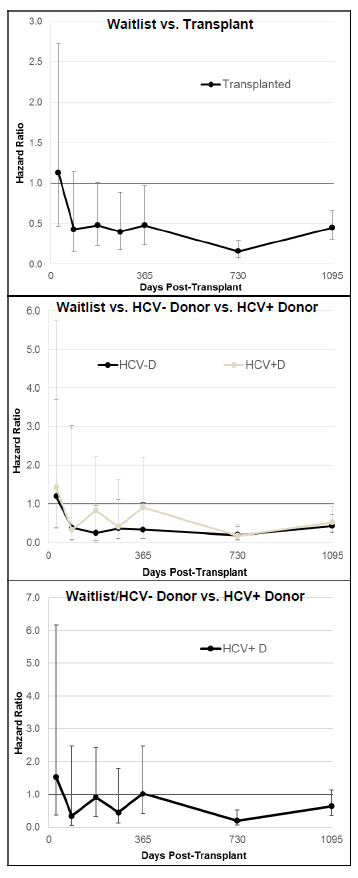
Mortality and Kidney Transplantation Outcomes among Chronic Dialysis Patients who are Seropositive for Hepatitis C Virus
Deirdre Sawinski1, Colleen Brensinger2, Kimberly Forde2,3, Justine Shults2, Vincent Lo Re III2,4, David Goldberg3, Joe Weldon5, Jayme Locke6, Peter Reese1,2.
1Nephrology, Department of Medicine, University of Pennsylvania, Philadelphia, PA, United States; 2Center for Clinical Epidemiology and Biostatistics, University of Pennsylvania, Philadelphia, PA, United States; 3Gastroenterology, Department of Medicine, University of Pennsylvania, Philadelphia, PA, United States; 4Infectious Diseases, Department of Medicine, University of Pennsylvania, Philadelphia, PA, United States; 5Davita Clinical Research, Minneapolis, MN, United States; 6Transplant Surgery, University of Alabama at Birmingham, Birmingham, AL, United States
Introduction: The end stage renal disease (ESRD) population is enriched with patients with HCV infection. However, lack of information about HCV serostatus in large ESRD and transplant registries in the United States (US) has limited research about outcomes among dialysis patients who have been infected with HCV and HCV-seropositive patients’ access to renal transplantation.
Materials and Methods: We linked detailed clinical data, that included HCV sersostatus, from a large dialysis provider with US transplant registry data and examined outcomes among patients receiving chronic dialysis between 1/1/2004 – 12/31/2014. Using Cox and cause-specific hazards regression, we evaluated adjusted hazard (aHR) and subhazard ratios (SHR) of all-cause mortality, transplant wait-listing, and kidney transplantation associated with HCV seropositivity status.
Results: Among 442,171 chronic dialysis patients, 31,624 (7.2%) were seropositive for HCV. HCV infection was associated with a small elevation in the risk of death (aHR 1.09, 95% CI 1.07-1.11) but a substantial reduction in access to the kidney transplant waitlist (SHR 0.67, 95% CI 0.61 - 0.73). Once waitlisted, HCV+ patients underwent transplantation as rapidly as seronegative patients (SHR 1.11, 95% CI 0.97-1.29) and derived a substantial survival benefit from kidney transplantation (aHR 0.37, 95% CI 0.31-0.46) compared to dialysis (Figure 1). Additionally, the strategy of accepting an HCV+ donor kidney provided a survival advantage (aHR 0.67, 95% CI 0.51-0.87) compared to remaining on the waitlist to wait for a HCV-negative donor kidney.
Discussion and Conclusion: Dialysis patients with HCV have reduced access to kidney transplantation, despite deriving a significant survival benefit from transplantation. Future research must focus on identifying and removing barriers to waitlisting for these patients.
NIH R21 DK108045.
